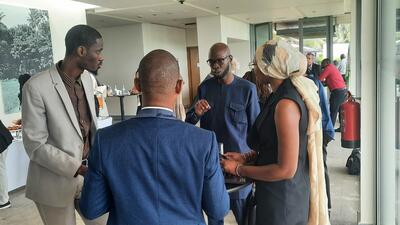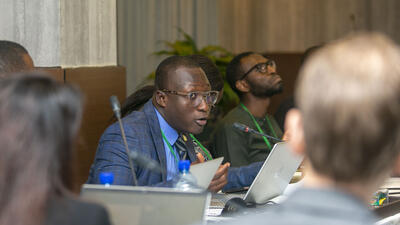News Brief
OECD Development Centre celebrates 50th anniversary
The Organisation for Economic Co-operation and Development (OECD) celebrated the 50th anniversary of its Development Centre at a high-level meeting in Paris on 1 March 2012. OECD Secretary-General Angel Gurría described the creation and mission of the centre since it was first suggested by President John F. Kennedy in 1961 as a space where advanced and developing countries could work together to help developing countries overcome economic and development challenges. Looking forward, Gurría said that achieving the mission now requires a broader approach to development and outlined the OECD Development Strategy aimed at increasing the coherence of OECD policies and supporting developing countries in designing better policies. Concluding his speech, he invited Development Centre members and representatives from international organizations at the meeting to share their views of the strategy. ‘We are keen on your ideas on how this organization can deliver on its commitment to fight poverty and contribute to sustainable and inclusive economic growth,’ he said.
Companies must step up support for sustainability
Georg Kell, Executive Director of the United Nation’s Global Compact, an initiative designed to foster socially responsible corporate practices, called for more companies to join the Compact ahead of the Rio+20 Corporate Sustainability Forum. The forum is part of the broader Rio+20 United Nations Conference on Sustainable Development that will be held in Rio de Janeiro, Brazil in June 2012.
More than 10,000 organizations have signed up to the Global Compact, including 7,000 businesses in 140 countries, and are working to advance environmental and social sustainability based on the initiative’s 10 principles covering human rights, labour, environment and anti-corruption. Speaking in New York in February 2012, Kell noted that 3,000 companies have been delisted for noncompliance with the programme. He said, ‘We are disappointed that the movement isn’t growing faster. Of course, it’s a big movement, but not yet transformative. Our hope is that Rio+20 will deliver strong encouragement for corporate sustainability.’
UNIDO notes role of energy efficiency in sustainable development
The United Nations Industrial Development Organization (UNIDO) published a report in January 2012 highlighting the importance of industrial energy efficiency in sustainable development. Entitled Industrial Energy Efficiency For Sustainable Wealth Creation: Capturing environmental, economic and social dividends, the report urges investment in energy-efficient technologies to help achieve sustainable growth and address the challenges of green growth, employment generation, security, climate change, food production and poverty reduction.
UNIDO Director-General Kandeh K. Yumkella said, ‘Improving industrial energy efficiency is key to sustainable industrial development worldwide but especially in the rapidly developing countries of the global South. It will help realize the global green economy and green industries. Investing in energy-efficient technologies, systems, processes, training and upgrading of skills must underpin low-carbon green growth.’ The report is UNIDO’s main contribution to the Sustainable Energy for All initiative introduced by United Nations Secretary-General Ban Ki-moon.
Finance forum focuses on SME sector
The first global forum presented by the Finance Alliance for Sustainable Trade (FAST) and hosted by Rabobank was held on 14 December 2011. It focused on improving metrics and information systems to strengthen a sustainable small- and medium-sized enterprise (SME) finance sector. It also acted as a seedbed for initiatives based on emerging trends in sustainable SME finance and impact investment, and introduced a Shared Impact Measurement Toolbox including benchmark indicators to measure the social, economic and environmental impacts of sustainable SME finance.
In addition to the central forum, workshops covered: financial schemes and innovative tools for sustainable SME finance; strategies to attract investment to sustainable rural SME finance; opportunities for microfinance institutions and local banks to invest in sustainable SMEs; and FAST Financial Fairs and capacity building for sustainable SMEs.
Forum on aid effectiveness drives inclusive development cooperation
The Fourth High Level Forum on Aid Effectiveness convened in Busan, South Korea on 1 December 2011. After three days of talks between donors, recipient governments, emerging economies, multilateral lenders and civil society representatives, the forum delivered the Busan Outcome Document. It pledges to ‘establish a new, inclusive and representative global partnership for effective development cooperation.’ The forum hosted not only traditional donors, but also emerging players such as China, India and Brazil, with all endorsing the outcome document, which also referred to the meeting as a reference for South-South partnerships on a voluntary basis. The forum was co-hosted by the Organisation for Economic Co-operation and Development and the South Korean government.







